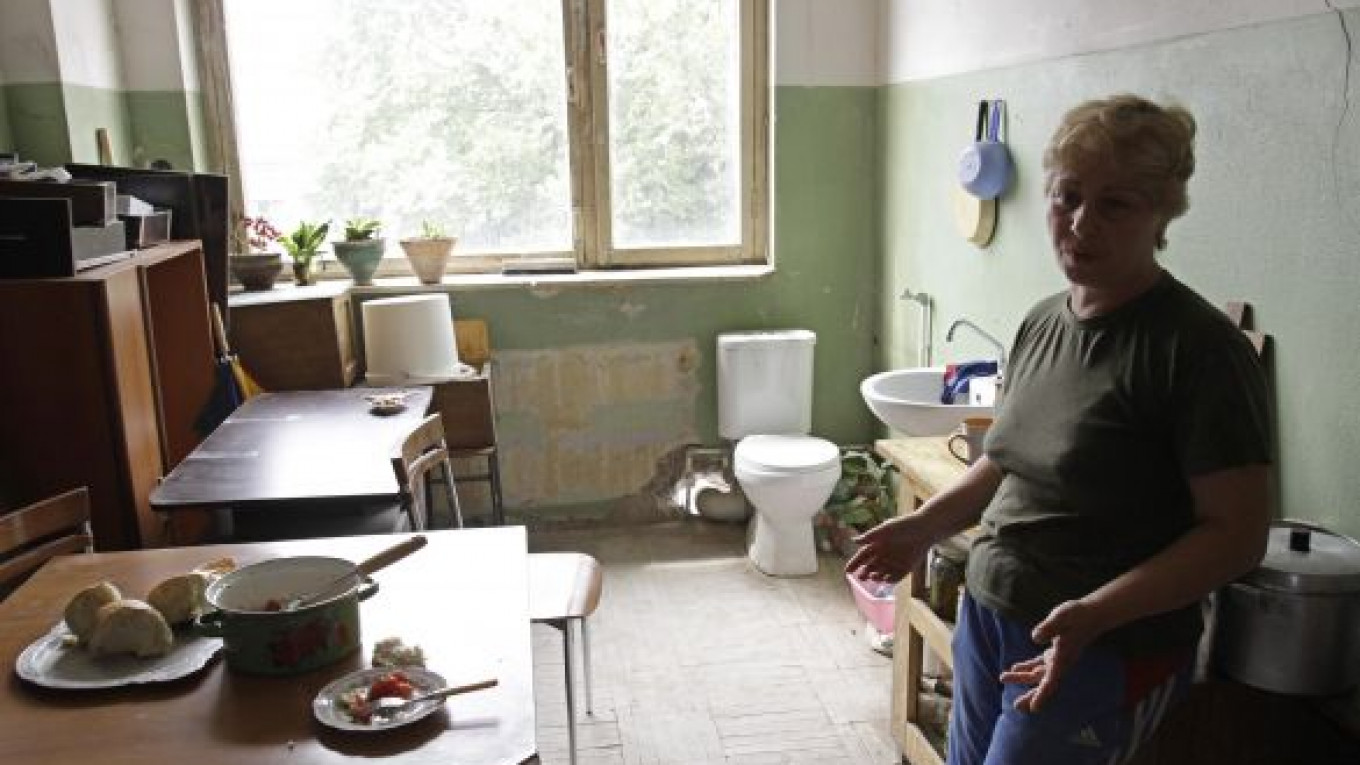TBILISI, Georgia — Georgian authorities are coming under fire from human rights groups over the forced eviction of hundreds of people displaced by war from state-owned buildings the government hopes to privatize.
The August evictions form part of the latest attempt to tackle a massive refugee problem stemming from conflicts in the early 1990s in the rebel regions of Abkhazia and South Ossetia, and again in 2008 when Russia and Georgia waged a five-day war.
But those evicted, classified as internally displaced persons, complain that they were given little prior notice, and many have rejected alternative accommodation in rural areas close to the rebel regions.
Others have been moved to a crumbling former science institute in the Georgian capital, Tbilisi, where beds, stoves and toilets are crammed into single rooms.
Those from Abkhazia have lived in Tbilisi for 17 years — many in old hospitals, barracks and a printing house — after more than 200,000 fled the rebel Black Sea region when it threw off Georgian rule with the Soviet collapse.
On Aug. 13, dozens were taken by bus to a remote village 350 kilometers from Tbilisi on the Abkhaz border, where they were given unfurnished apartments in a renovated barracks with no electricity and little prospect of finding work.
The United Nations refugee agency expressed concern last week that the evictions "have not been undertaken with the necessary transparency or circulation of information." But it said progress was being made to improve procedures.
Georgia's ombudsman said most people had been given verbal notification of the eviction five days in advance and were told little more than the geographic location of the new accommodation. Some said they were given no notice at all.
"The government took the responsibility to settle all of them. It's not right to offer all of them houses in the provinces," said Eka Popkhadze of the Georgian Young Lawyers Association, a human rights nongovernmental organization. "They work here; their children go to schools or institutes in the capital. How can they move to the countryside now?"
Georgia's Ministry for Internally Displaced People from Occupied Territories, Accommodation and Refugees rejected the criticism.
"No one will be left in the street," said ministry adviser Valery Kopaleishvili. "This process will take some time and will continue until all refugees are satisfied."
A report in August by British-based rights watchdog Amnesty International called on Georgia to do "more than the bare minimum" for those displaced by war. The government, it said, must ensure employment, access to health care and benefits.
The report said 42 percent were still housed in kindergartens, hospitals, hotels and barracks.
This week, a handful of refugees from Abkhazia evicted from a former military hospital sewed their lips shut in a protest on the steps of the ministry.
"Where will I get food from? Where will I eat?" said Luba Todua, 72, a displaced Georgian who did not seal her lips.
"What did [former President Eduard] Shevardnadze do for us, and now what are this lot doing for us?" said Todua, who has rejected alternative accommodation in western Georgia.
Georgia's political opposition is backing small street protests by the displaced people, trying to revive opposition to President Mikheil Saakashvili, who survived weeks of protests after the 2008 war when Russia crushed a Georgian assault on South Ossetia.
The war cost Saakashvili credibility among Georgia's Western allies, many of whom were already concerned over an apparent authoritarian streak in the president and his commitment to democracy and free media.
A Message from The Moscow Times:
Dear readers,
We are facing unprecedented challenges. Russia's Prosecutor General's Office has designated The Moscow Times as an "undesirable" organization, criminalizing our work and putting our staff at risk of prosecution. This follows our earlier unjust labeling as a "foreign agent."
These actions are direct attempts to silence independent journalism in Russia. The authorities claim our work "discredits the decisions of the Russian leadership." We see things differently: we strive to provide accurate, unbiased reporting on Russia.
We, the journalists of The Moscow Times, refuse to be silenced. But to continue our work, we need your help.
Your support, no matter how small, makes a world of difference. If you can, please support us monthly starting from just $2. It's quick to set up, and every contribution makes a significant impact.
By supporting The Moscow Times, you're defending open, independent journalism in the face of repression. Thank you for standing with us.
Remind me later.






